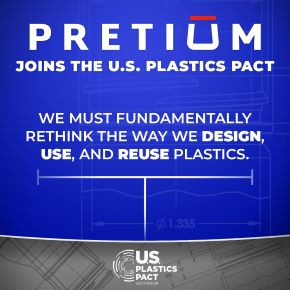Pretium joins U.S. Plastics Pact, committing to meet ambitious Circular Economy goals by 2025
Pretium has joined the U.S. Plastics Pact, a collaborative, solutions-driven initiative rooted in four ambitious goals intended to drive significant systems change by unifying diverse cross-sector approaches, setting a national strategy, and creating scalable solutions to create a path forward toward a circular economy for plastics in the United States by 2025. The first North American Pact of its kind, the U.S. Pact is a collaboration led by The Recycling Partnership, World Wildlife Fund (WWF), and Ellen MacArthur Foundation.
As part of the U.S. Pact, activators like Pretium recognise that significant, system-wide change is imperative to realise a circular economy for plastics. As such, the U.S. Pact will convene more than 70 brands, retailers, NGOs, and government agencies across the plastics value chain to bring one voice to U.S. packaging through coordinated initiatives and innovative solutions for rethinking products, packaging, and business models.
“We are delighted to join the U.S. Plastics Pact as their stated goals perfectly align with Pretium’s strategy to fight the global problems of plastic waste through the elimination of both single-use packaging and non-recyclable plastic materials from our portfolio. Pretium has always been a leader in the use of post-consumer recycled materials across all of our product lines. Looking forward we are increasing our investment in our product offerings to drive more options for our customers and greater adoption of this resource. Additionally, we are committed to not contribute to the problem by focusing our efforts on processing only resins that can be commercially recycled and eliminating product lines like multi-layer containers that contaminate the recycling streams or purely convenience type containers such as water bottles for which there are more sustainable alternatives. Our efforts are completely aligned with the U.S. Plastics Pact to further the ultimate solution of the circular economy for plastics.” Paul Kayser, Pretium Packaging, CEO.
As an Activator of the U.S. Plastics Pact, Pretium has agreed to collectively deliver against these four ambitious goals:
1. Define a list of packaging to be designated as problematic or unnecessary by 2021 and take measures to eliminate them by 2025.
2. By 2025, all plastic packaging is 100% reusable, recyclable, or compostable.
3. By 2025, undertake ambitious actions to effectively recycle or compost 50% of plastic packaging.
4. By 2025, the average recycled content or responsibly sourced bio-based content in plastic packaging will be 30%.
While the U.S. Pact is complementary to, and follows the ambitious precedents set by the existing global network of Plastic Pacts, it will be tailored to meet the unique needs and challenges of the U.S. market. The Pact will reflect national priorities and realities, while still propelling the nation closer to other developed nations in its management of plastic waste.“Together through the U.S. Plastics Pact, we will ignite system change to accelerate progress toward a circular economy,” says Emily Tipaldo, Executive Director of the U.S. Plastics Pact. “The U.S. Pact will mobilise system-wide change through support for upstream innovation and a coordinated national strategy. This unified framework will enable members to fast-track progress toward our ambitious 2025 sustainability goals. Members’ full participation will be vital to reaching our shared goals.” Achieving this vision will require new levels of accountability from all facets of the plastics supply chain. The U.S. Pact emphasises measurable change and as such, Pretium is committed to transparent, annual reporting, guided by WWF’s ReSource: Plastic Footprint Tracker, which will be used to document annual progress against our four goals. The first task of the founding members of the U.S. Plastics Pact will be to establish a “roadmap” in 2021 to identify key milestones and national solutions to achieving the U.S. targets and realize a circular economy in which plastic never becomes waste.

